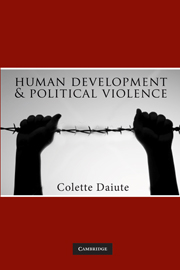Book contents
- Frontmatter
- Contents
- List of Figures
- List of Tables
- Preface
- 1 Beyond the Youth Gap in Understanding Political Violence
- 2 Youth and Society Work Together
- 3 Living History
- 4 Critical Narrating
- 5 Participation Matters
- 6 Sociobiographies
- 7 Human Development in Conflict
- Appendix: Examples of Public Stories across Positions in the DSTY Research Workshop
- References
- Index
Preface
Published online by Cambridge University Press: 05 June 2012
- Frontmatter
- Contents
- List of Figures
- List of Tables
- Preface
- 1 Beyond the Youth Gap in Understanding Political Violence
- 2 Youth and Society Work Together
- 3 Living History
- 4 Critical Narrating
- 5 Participation Matters
- 6 Sociobiographies
- 7 Human Development in Conflict
- Appendix: Examples of Public Stories across Positions in the DSTY Research Workshop
- References
- Index
Summary
When writing a letter to a public official, Visnja, a young woman whose life has been defined by war, echoes sentiments expressed by many other young people growing up during and after political violence across the world.
Hmmm, hmmm, who should I write to? I am 24 years old, and for 10 years already I have problems, I live in them. Who should I talk to, and who would be open to listening to the “complaints of the youth” and take them seriously? Everyone is shaking their head for 10 years already, the old guard politicians are still shaking their heads, and they tell us ‘it will be better.’…Yeah, right!
Comments like Visnja's implore those of us who work with young people to learn more about how they perceive environments of armed conflict and its aftermath. Toward that end, the goal of the research discussed in this book was to interact with young people involved in practical activities to gain insights about the development of individuals and society. With an innovative theoretical approach, we ask, “How do young people growing up in political violence understand their plight?”
In spite of our advances, civilization at the beginning of the 21st century continues to be characterized by political violence, which is experienced by increasing numbers of young people (Barber, 2009; Boyden, 2009).
- Type
- Chapter
- Information
- Human Development and Political Violence , pp. xv - xxiiPublisher: Cambridge University PressPrint publication year: 2010



